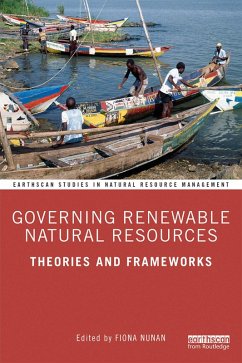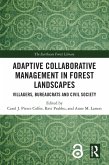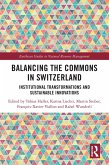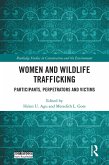Governing Renewable Natural Resources (eBook, ePUB)
Theories and Frameworks
Redaktion: Nunan, Fiona
43,95 €
43,95 €
inkl. MwSt.
Sofort per Download lieferbar

22 °P sammeln
43,95 €
Als Download kaufen

43,95 €
inkl. MwSt.
Sofort per Download lieferbar

22 °P sammeln
Jetzt verschenken
Alle Infos zum eBook verschenken
43,95 €
inkl. MwSt.
Sofort per Download lieferbar
Alle Infos zum eBook verschenken

22 °P sammeln
Governing Renewable Natural Resources (eBook, ePUB)
Theories and Frameworks
Redaktion: Nunan, Fiona
- Format: ePub
- Merkliste
- Auf die Merkliste
- Bewerten Bewerten
- Teilen
- Produkt teilen
- Produkterinnerung
- Produkterinnerung

Bitte loggen Sie sich zunächst in Ihr Kundenkonto ein oder registrieren Sie sich bei
bücher.de, um das eBook-Abo tolino select nutzen zu können.
Hier können Sie sich einloggen
Hier können Sie sich einloggen
Sie sind bereits eingeloggt. Klicken Sie auf 2. tolino select Abo, um fortzufahren.

Bitte loggen Sie sich zunächst in Ihr Kundenkonto ein oder registrieren Sie sich bei bücher.de, um das eBook-Abo tolino select nutzen zu können.
In one volume, this book brings together a diversity of approaches, theory and frameworks that can be used to analyse the governance of renewable natural resources
- Geräte: eReader
- ohne Kopierschutz
- eBook Hilfe
- Größe: 10.52MB
Andere Kunden interessierten sich auch für
![Adaptive Collaborative Management in Forest Landscapes (eBook, ePUB) Adaptive Collaborative Management in Forest Landscapes (eBook, ePUB)]() Adaptive Collaborative Management in Forest Landscapes (eBook, ePUB)0,99 €
Adaptive Collaborative Management in Forest Landscapes (eBook, ePUB)0,99 €![Balancing the Commons in Switzerland (eBook, ePUB) Balancing the Commons in Switzerland (eBook, ePUB)]() Balancing the Commons in Switzerland (eBook, ePUB)0,99 €
Balancing the Commons in Switzerland (eBook, ePUB)0,99 €![Conservation Leadership (eBook, ePUB) Conservation Leadership (eBook, ePUB)]() Simon BlackConservation Leadership (eBook, ePUB)39,95 €
Simon BlackConservation Leadership (eBook, ePUB)39,95 €![Women and Wildlife Trafficking (eBook, ePUB) Women and Wildlife Trafficking (eBook, ePUB)]() Women and Wildlife Trafficking (eBook, ePUB)43,95 €
Women and Wildlife Trafficking (eBook, ePUB)43,95 €![Routledge Handbook of Rewilding (eBook, ePUB) Routledge Handbook of Rewilding (eBook, ePUB)]() Routledge Handbook of Rewilding (eBook, ePUB)45,95 €
Routledge Handbook of Rewilding (eBook, ePUB)45,95 €![Reindeer Husbandry and Global Environmental Change (eBook, ePUB) Reindeer Husbandry and Global Environmental Change (eBook, ePUB)]() Reindeer Husbandry and Global Environmental Change (eBook, ePUB)0,99 €
Reindeer Husbandry and Global Environmental Change (eBook, ePUB)0,99 €![The Age of Sustainability (eBook, ePUB) The Age of Sustainability (eBook, ePUB)]() Mark SwillingThe Age of Sustainability (eBook, ePUB)0,99 €
Mark SwillingThe Age of Sustainability (eBook, ePUB)0,99 €-
-
-
In one volume, this book brings together a diversity of approaches, theory and frameworks that can be used to analyse the governance of renewable natural resources
Dieser Download kann aus rechtlichen Gründen nur mit Rechnungsadresse in A, B, BG, CY, CZ, D, DK, EW, E, FIN, F, GR, HR, H, IRL, I, LT, L, LR, M, NL, PL, P, R, S, SLO, SK ausgeliefert werden.
Produktdetails
- Produktdetails
- Verlag: Taylor & Francis
- Seitenzahl: 264
- Erscheinungstermin: 26. November 2019
- Englisch
- ISBN-13: 9780429626647
- Artikelnr.: 58318657
- Verlag: Taylor & Francis
- Seitenzahl: 264
- Erscheinungstermin: 26. November 2019
- Englisch
- ISBN-13: 9780429626647
- Artikelnr.: 58318657
- Herstellerkennzeichnung Die Herstellerinformationen sind derzeit nicht verfügbar.
Fiona Nunan is Professor of Environment and Development in the International Development Department, University of Birmingham, UK.
1. Introduction: governing renewable natural resources 2. Management in the
guise of governance? Rethinking the Ends and the means of natural resource
governance 3. Networked participation: how social network analysis can
inform participatory processes in environmental governance 4. Analyzing
natural resource governance with the social-ecological systems framework 5.
Analysing institutions to explain the practice and outcomes of fisheries
co-management 6. Community governance of common-pool resources: exploring
institutional interfaces 7. Indigenous polycentric and nested customary
sea-tenure (CST) Institutions: a Solomon Islands case study 8. Political
ecologies of resource governance: ontologies, agency and practice 9. The
state as a person: the role of interface bureaucrats in everyday natural
resource governance 10. Institutional recognition politics in forestry:
when the plurality of state law undermines local democracy 11. In search of
new modes of governance: the potential of conservation incentive payment
policies to promote human-wildlife co-existence 12. Conclusion: working
towards diverse, flexible and inclusive natural resource governance
guise of governance? Rethinking the Ends and the means of natural resource
governance 3. Networked participation: how social network analysis can
inform participatory processes in environmental governance 4. Analyzing
natural resource governance with the social-ecological systems framework 5.
Analysing institutions to explain the practice and outcomes of fisheries
co-management 6. Community governance of common-pool resources: exploring
institutional interfaces 7. Indigenous polycentric and nested customary
sea-tenure (CST) Institutions: a Solomon Islands case study 8. Political
ecologies of resource governance: ontologies, agency and practice 9. The
state as a person: the role of interface bureaucrats in everyday natural
resource governance 10. Institutional recognition politics in forestry:
when the plurality of state law undermines local democracy 11. In search of
new modes of governance: the potential of conservation incentive payment
policies to promote human-wildlife co-existence 12. Conclusion: working
towards diverse, flexible and inclusive natural resource governance
1. Introduction: governing renewable natural resources 2. Management in the
guise of governance? Rethinking the Ends and the means of natural resource
governance 3. Networked participation: how social network analysis can
inform participatory processes in environmental governance 4. Analyzing
natural resource governance with the social-ecological systems framework 5.
Analysing institutions to explain the practice and outcomes of fisheries
co-management 6. Community governance of common-pool resources: exploring
institutional interfaces 7. Indigenous polycentric and nested customary
sea-tenure (CST) Institutions: a Solomon Islands case study 8. Political
ecologies of resource governance: ontologies, agency and practice 9. The
state as a person: the role of interface bureaucrats in everyday natural
resource governance 10. Institutional recognition politics in forestry:
when the plurality of state law undermines local democracy 11. In search of
new modes of governance: the potential of conservation incentive payment
policies to promote human-wildlife co-existence 12. Conclusion: working
towards diverse, flexible and inclusive natural resource governance
guise of governance? Rethinking the Ends and the means of natural resource
governance 3. Networked participation: how social network analysis can
inform participatory processes in environmental governance 4. Analyzing
natural resource governance with the social-ecological systems framework 5.
Analysing institutions to explain the practice and outcomes of fisheries
co-management 6. Community governance of common-pool resources: exploring
institutional interfaces 7. Indigenous polycentric and nested customary
sea-tenure (CST) Institutions: a Solomon Islands case study 8. Political
ecologies of resource governance: ontologies, agency and practice 9. The
state as a person: the role of interface bureaucrats in everyday natural
resource governance 10. Institutional recognition politics in forestry:
when the plurality of state law undermines local democracy 11. In search of
new modes of governance: the potential of conservation incentive payment
policies to promote human-wildlife co-existence 12. Conclusion: working
towards diverse, flexible and inclusive natural resource governance







